The world has been thrown into yet another catastrophe caused by the Russian attack on Ukraine and the retaliatory sanctions imposed on Russia by the major economies of the world. It is now time to see how would these twin crises of the pandemic and the ongoing conflict affect the geopolitics and world economy. Russia accounts for nearly a quarter of the global gas market and has been a major supplier of crude, platinum. Russia and Ukraine are also the top suppliers of neon gas, essential for making semiconductor chips, an essential component of every electronic item. Even though the direct effect of sanctions on major economies might appear minuscule as they may have relatively smaller and limited trade with Russia, they too would suffer significantly on account of indirect, collateral, and tangential repercussions.
John F Kennedy, the former President of the United States of America is credited for the quote “When written in Chinese, the word crisis is composed of two characters, one represents danger and the other opportunity.” The statement has been proven prophetic in many crises including the COVID-19 pandemic that raged throughout the world for over two years with the only caveat that the crisis poses danger to the most and presents an opportunity for a chosen few, thus making the world all the more inequitable.
As the world economy was still recuperating from the two years’ badgering by the COVID-19 pandemic, Europe, and consequentially the world as a whole, have been thrown into yet another catastrophe caused by the Russian attack on Ukraine and the retaliatory sanctions imposed on Russia by the major economies of the world. It is now time to see how would these twin crises affect the geopolitics and world economy.
Humanitarian crises causing loss of life and property, forced dislocation of a sea of humanity, and human sufferings are the most obvious and catastrophic manifestations of wars anywhere in the world. The economic and financial consequences of conflicts multiply the miseries of people manifold and cripple not only the oppressed and the oppressor but a larger part of the world for a much longer period, even if the war gets over sooner.
The consequential economic sanctions aggravate the situation further. In a globalized world, however, sanctions have a two-way effect. While it may deprive Russia of funds and facilities, it may also adversely impact most other countries of the world, including the ones who impose the sanctions. Even though the direct effect of sanctions on major economies might appear minuscule as they may have relatively smaller and limited trade with Russia, they too would suffer significantly on account of indirect, collateral, and tangential repercussions.
Even though the direct effect of sanctions on major economies might appear minuscule as they may have relatively smaller and limited trade with Russia, they too would suffer significantly on account of indirect, collateral, and tangential repercussions.
Russia accounts for nearly a quarter of the global gas market and has been a major supplier of crude, platinum, and semiconductor chip (Anand, 2022). Europe has particularly been dependent on Russian natural gas to meet its energy needs. Alternative sources of energy are difficult to find and are expected to be quite expensive in the short term (Gill, 2022). Sanctions by the west on Russia have been making procurement of materials from there nearly next to impossible for many countries and with pressures mounting from the US, most countries are likely to fall in line, though India has so far shown its commitment to import its oil from Russia at a discounted price.
Russia may have hoped that Germany would not stop the launch of Nordstream 2, a 1250 km long pipeline running from Russia to Germany to potentially serve 26 million German homes (Rainkin, 2022). It must now be hugely disappointing, as Germany has not only suspended the commissioning of this pipeline but has also stopped importing gas through the already operational Nordstream 1. Russia has been earning almost 60 percent of its export revenue from the European Union (EU). The wide-ranging sanctions on Russia would squeeze it out of international trade thereby adversely impacting its ability to honour financial obligations. This is no less than an economic siege on Russia.
As the crisis began, the global crude prices shot up to $104 per barrel (Gill, 2022), the highest since 2014. Though it has slid down a bit since then, a sharper rise cannot be ruled out if the war prolongs or escalates further. The rise in oil prices would for sure cause a rise in inflation as the world transportation of goods is still largely dependent on oil.
Russia and Ukraine are the top suppliers of neon gas, essential for making semiconductor chips, an essential component of every electronic item (Channan, 2022). This will have damaging consequences, particularly because it is coming at a time when the supply chain disruptions have already caused a severe shortage of semi-conductor. The consequential bottlenecks may cause global shortages of electronic items impacting the market, profitability and sustainability, and even survival of many manufacturers and suppliers of these items (Channan, 2022).
Also Read: Russia-Ukraine Crisis: A Big Boost for Iranian Economy?
Russia accounts for nearly a quarter of the global gas market and has been a major supplier of crude, platinum. Russia and Ukraine are also the top suppliers of neon gas, essential for making semiconductor chips, an essential component of every electronic item.
The crisis has caused financial turbulence globally, with major world financial markets showing losses. Economies with large current deficits will struggle to pay their debts [5]. Even somewhat neutral countries are experiencing a rapid outflow of foreign portfolio investments. Some are compelled to become net sellers of forex to keep their currencies stable. A few, who were so far depending on the dollar for their international trade, have already begun resorting to alternative currencies like the Japanese Yen for their international trade.
The world is also staring at huge default risk as many banks have debts exposures in Russia which may become impossible to recover under the present circumstances. Banks from EEZ and US have a combined exposure of more than $100 billion in the Russian market, some of the affected banks are, Unicredit, Raiffeisen Bank International, Societe Generale, Credit Agricole, BNP Paribas, Intesa Sanpaolo, ING, UBS, and CITI group (Business Standards, 2022).
Additionally, many European banks have their operations in Ukraine and Russia, and the sanctions will hamper their business in both countries. Due to sanctions, almost all foreign companies have left the Russian market. Apple Pay, Google Pay, Mastercard, VISA, AmEx have also stopped operations making it hard for Russians to make electronic transactions. Russian banks are now considering issuing cards using UnionPay, the Chinese card network (Channan, 2022).
Russia has been excluded from SWIFT, the global system which enables international financial transactions, thereby cutting its bank off the global network and thus banning them from making international transactions, beyond completing the already initiated transaction (Channan, 2022). Russian Ruble has already taken a big hit and is being traded at less than a cent. To check the flight of the capital, Russia has already doubled the interest rate from 9.5 percent to a whopping 20 percent. None of these augurs well for most of the world.
Yet another implication for companies leaving Russia is the immovable assets they’re leaving behind. The Russian government has ordered such assets to be nationalised and has made it legal to copy patents of companies from unfriendly nations and make a copy of their products to sell in its market.
You May Like: The Lessons for Taiwan from Russia-Ukraine Conflict
The world is also staring at huge default risk as many banks have debts exposures in Russia which may become impossible to recover under the present circumstances.
Can India Remain Insulated?
Strategically, Russia has been a tried and trusted ally of India and a major defence partner. Most of India’s artillery, aircraft – the MiG and Sukhoi series, and its submarine fleet were sourced from Russia or the USSR in past. Lately, however, India has been looking westwards, particularly the US, for its military and economic needs. Despite this tilt, India has been steering clear of taking sides and championing the cause of mediated and negotiated settlement of the dispute and has abstained from voting in UNSC.
Lately, India and China have not been the best of friends and Russia has always been supportive of India in various forums like the BRICS, RIC, SCO, etc. against China (Gill, 2022). India has also recently purchased the S-400 air defence system from Russia and if hard sanctions are imposed on Russia by the US and her allies under the CAATSA act of 2021, it’ll make it difficult, if not impossible for India to complete the transaction (Gill, 2022). China has, of late, become a cause of concern for India. How would India handle the situation if China comes to directly support Russia financially or militarily? Only time would tell!
Economically, India is heavily dependent on imports for its energy needs. The rise in energy prices has always had ripple effects and multiple consequences. Letting the prices be determined by the market, may cause havoc in terms of price rise and inflation (Kumar, 2022). The profitability and sustainability of oil companies may be challenged if they are constrained to absorb the price rise themselves. Reducing excise duty and taxes on oil to keep the aviation and retail fuel prices in check may seriously dent the public exchequer.
Also Read: Bracing for the Changing Geopolitics: Ukraine Crisis and Energy Security in India
India has purchased the S-400 air defence system from Russia, and if hard sanctions are imposed on Russia by the US under the CAATSA, it’ll make it difficult for India to complete the transaction
This conflict has brought to the fore the importance to have a domestic payments system and, thus, be less reliant on global networks like Mastercard and VISA. Pulling out of these global networks has been adding woes to Russian people as they are unable to even make domestic payments using these cards. India has fortunately been farsighted as far as the payment systems are concerned. RuPay by NPCI, accepted within India as well as in the Middle East, has emerged as a popular domestic alternative to international card systems. RuPay presently accounts for 60 percent of the total cards issued within the Indian territory.
So is the UPI, a P2P financial transaction platform facilitated by the NPCI entirely domestic with almost zero transaction costs. With these two in place, India, to a large extent is shielded from any imminent threat on account of a sudden pullout by international players like Google Pay and Apple Pay as well. India also seems to have a window of opportunity in this conflict as due to sanctions India can offer Russia to use its payment services, which will increase its user base and acceptability globally.
Indian banks cannot transact with Russia due to the latest sanctions. Hence, we can’t import oil using traditional methods, for which the Russian government has suggested making the use of Rupee-Ruble swap for transactions in the oil and other key areas, as it’ll bypass the traditional method of transactions using US dollars.
Speaking of the exposure, the SBI and Canara Bank have a subsidiary in Russia, namely Commercial Indo Bank, with an exposure of around $72 million (as per the 2020 balance sheet of SBI). The sanctions will hamper its ability to transact outside of Russia, and also make its future uncertain. Reportedly the Indian insurance companies do not have much exposure in terms of general insurance in Ukraine, where the Russian invasion has led to wide-scale destruction. Even in Russia, they are said to have only limited exposure. As regards marine insurance, the insurers shall experience a decline in their business as they would find it difficult to insure shipments originating from ports in the Black Sea (Saul, 2022).
You May Read: Russia-Ukraine Crisis: The Impact on India
India seems to have a window of opportunity in this conflict as, due to sanctions, India can offer Russia to use its payment services, which will increase its user base and acceptability globally.
They’re also planning to add war as a form of risk in marine insurance (Saul, 2022). All these steps will lead to minimising the impacts of war on the financial and banking sector of India and the world. With an ever-increasing role in central Asia, India may be facing the dilemma of deciding between strategic issues in the region and its national interests, particularly when it would come to choosing between its time-tested friends and allies and the newest buddy in town (Mishra, 2022). It may be hoped that what Henry Kissinger quipped, a long time ago – “to be an enemy of America can be dangerous, but to be a friend is fatal” – may no more hold under the changing geopolitics.
References (as accessed on 14 March 2022)
- Anand, JC (2022), Russia Ukraine Conflict: What It means for India and Investors, The Economic Times, 25 February. Retrieved from https://economictimes.indiatimes.com/news/economy/indicators/russia-ukraine-crisis-what-it-means-for-india-and-investors/articleshow/89792293.cms?from=mdr
- Business Standard (2022), Ukraine crisis: Economic dangers from Russia’s invasion ripple across globe, Business Standard, 3 March. Retrieved from https://www.business-standard.com/article/international/ukraine-crisis-economic-dangers-from-russia-s-invasion-ripple-across-globe-122030300042_1.html
- Channan, Manoj K (2022), Russia Ukraine Crisis: Global impact and lessons for India, Financial Express, 27 February. Retrieved from https://www.financialexpress.com/defence/russia-ukraine-crisis-global-impact-and-lessons-for-india/2445765/
- Gill, Indermit (2022), Developing economies must act now to dampen the shocks from the Ukraine conflict, Brookings, 8 March. Retrieved from https://www.brookings.edu/blog/future-development/2022/03/08/developing-economies-must-act-now-to-dampen-the-shocks-from-the-ukraine-conflict/
- Kumar, Arun (2022), What India Needs to do to Deal with the Consequences of the Russia Ukraine War, The Wire. 26 February. Retrieved from https://thewire.in/economy/india-russia-ukraine-war-consequences-impact
- Mishra, Vivek (2022), The Ukraine Crisis and India: Balancing Triumphs and Tribulation, Raisina Debates, Observer Research Foundation (ORF), 10 February, New Delhi, retrieved from https://www.orfonline.org/expert-speak/the-ukraine-crisis-and-india/
- Rankin, Jennifer (2022), What have Nord Stream 2 and gas got to do with Ukraine Standoff? The Guardian 7 February, London. Retrieved from https://www.theguardian.com/world/2022/feb/07/what-have-nord-stream-2-and-gas-got-to-do-with-ukraine-standoff
- Saul, Jonathan (2022), Marine insurers widen high-risk area as Ukraine conflict escalates The Reuters 8 March, London. Retrieved from https://www.reuters.com/legal/transactional/marine-insurers-widen-high-risk-area-ukraine-conflict-escalates-2022-03-08/
Disclaimer: The views expressed in this article are of the authors solely. TheRise.co.in neither endorses nor is responsible for them.

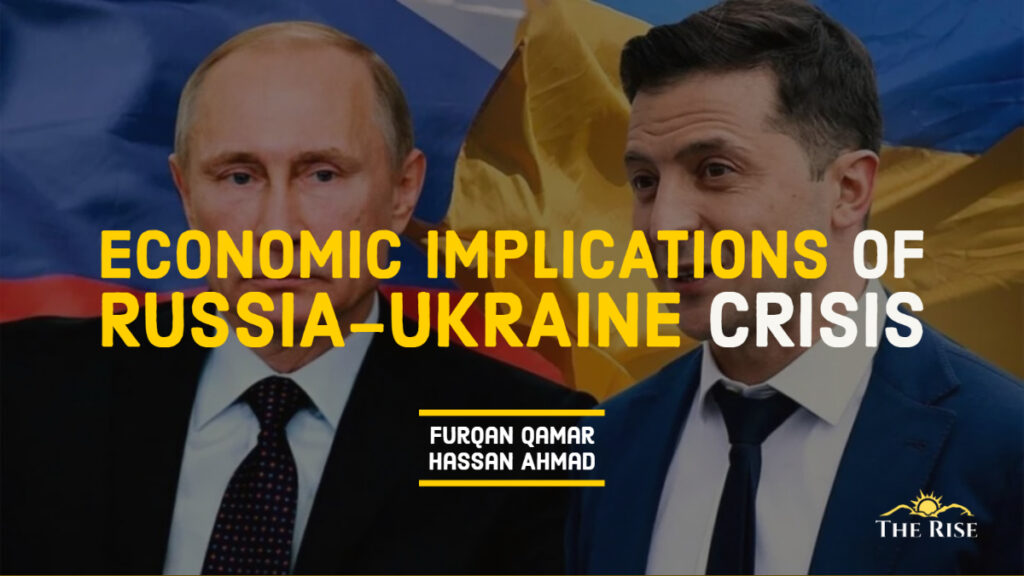







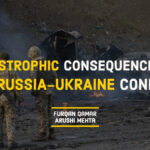

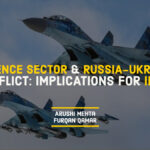
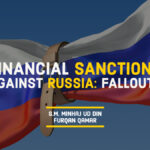

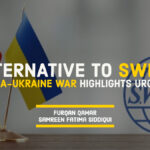
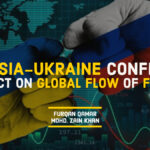


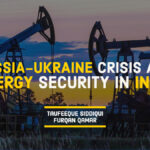


















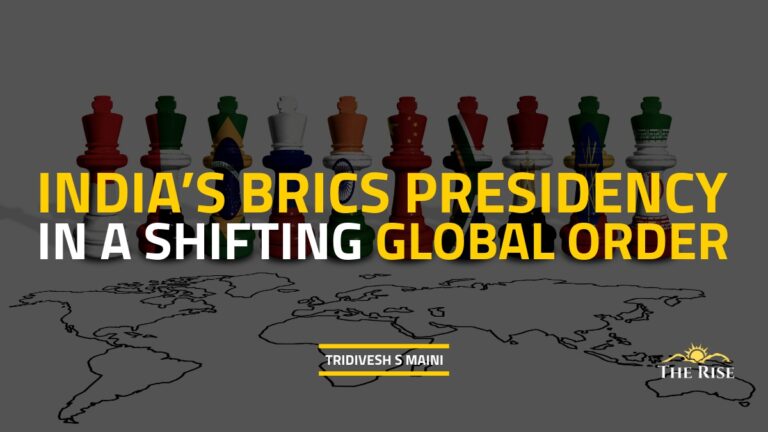



Pingback: Russia - Ukraine Conflict and Defence Sector: Implications for India
Pingback: Significance of Neutrality for Ukraine - TheRise.co.in